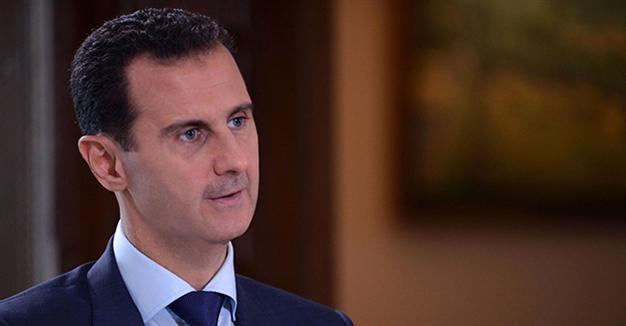Syria's Assad says Moscow 'never' spoke of departure
BEIRUT - Agence France-Presse
 Syrian President Bashar al-Assad said July 14 he has never faced pressure from Russia to step aside, as US Secretary of State John Kerry headed to Moscow seeking to revive stalled peace efforts.
Syrian President Bashar al-Assad said July 14 he has never faced pressure from Russia to step aside, as US Secretary of State John Kerry headed to Moscow seeking to revive stalled peace efforts.Speaking to NBC News in Damascus, Assad insisted his Russian counterpart Vladimir Putin and Foreign Minister Sergei Lavrov had never raised the issue of his departure or a political transition.
"Only the Syrian people define who's going to be the president, when to come, and when to go. They never said a single word regarding this," he said.
Assad's fate is a key question in efforts to bring about a negotiated settlement to Syria's five-year civil war.
Hopes for the existing peace process rest on the UN-backed blueprint sketched out by the 22-nation, US and Russian-led International Syria Support Group.
Under this road map, signed by both Syria's ally Iran and Assad's pro-rebel foe Saudi Arabia, a nationwide ceasefire will precede Geneva-based talks on "political transition."
But there has been little progress towards a resumption of political talks that was scheduled for August 1.
Kerry was due to arrive later July 14 in Moscow, a close ally of Assad's government that launched air strikes in support of regime forces last October.
Kerry said before leaving Washington that he would meet Putin "to see if we can somehow advance this (the peace process) in the important ways that people want us to."
Moscow and Washington brokered a landmark partial ceasefire in Syria in February but it has since all but collapsed amid continued heavy fighting.
Kerry's spokesman John Kirby told reporters his boss was "extremely frustrated" with the failure of peace efforts and "his patience was growing thin".
In Washington, many observers have criticised Kerry's outreach to Russia on Syria, arguing he has been strung along by Putin as he seeks to protect his client Assad.
But Kirby insisted the administration is not being naive, and that the visit to Moscow, Kerry's third this year, would "probe the sincerity" of Putin's promises.
Syria's conflict began in 2011 with the brutal repression of anti-government demonstrations and has evolved into a complex multi-front war that has left more than 280,000 dead and forced millions from their homes.
Efforts to bring an end to the war have taken on greater urgency since the emergence of the ISIL group, which seized control of large parts of Syria and neighbouring Iraq in mid-2014.
The jihadist group has committed widespread atrocities in areas under its control and organised or inspired a wave of attacks across the Middle East and in Western cities.
A US-led coalition is carrying out air strikes against the jihadists in Syria and Iraq and recent months have seen ISIL lose significant territory.
The Washington Post reported July 14 that Washington was to offer to cooperate with Russia in joint military action against ISIL and the Syrian branch of Al-Qaeda, Al-Nusra Front.
In Paris before heading to Moscow, Kerry did not deny the report, but refused to discuss the proposal in detail until he had been to the Kremlin.
According to the Post, which cited sections of what it said was a draft agreement, US and Russian commanders would set up a joint command and control centre to direct intensified air strikes against the groups.
Such a deal is likely to face criticism that it amounts to a tacit acceptance of Putin's efforts to shore up Assad's regime.
In his interview with NBC, Assad also said a US reporter killed in alleged Syrian government bombardment in 2012 was responsible for her own death.
Marie Colvin, a 56-year-old war correspondent working for British newspaper The Sunday Times, died in the rebel-held Baba Amr district of Syria's third city Homs.
"It's a war and she came illegally to Syria. She worked with the terrorists, and because she came illegally, she's been responsible of everything that befall on her," Assad said, speaking in English.
Asked if she was responsible for her own death, Assad replied "of course," though he denied that his forces had targeted her.
His comments came days after relatives of Colvin filed a lawsuit in a US court alleging Assad's regime targeted her to stop her covering government atrocities.
he suit, based on information from captured government documents as well as defectors, claims the Syrian military intercepted Colvin's communications and unleashed a barrage of rocket fire on her location, killing her and French photographer Remi Ochlik.
















